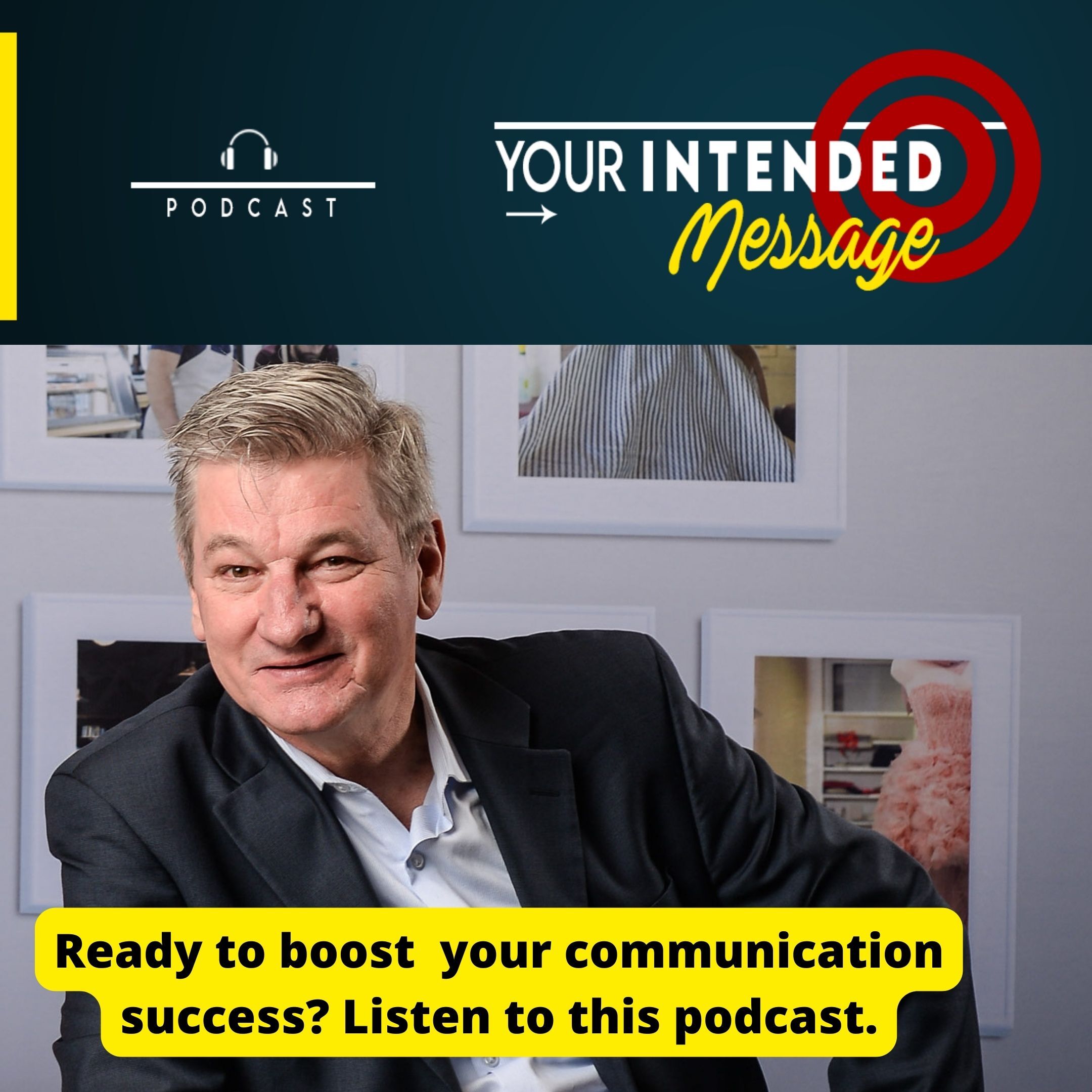
17.5K
Downloads
292
Episodes
The podcast about Effective Communication in Business
Better communication skills will advance your career and business. Are you ready to enhance your understanding and results from better communication? Listen and learn how to deliver Your Intended Message.
Are you willing to cross-examine communication from various perspectives? Would you like to deliver your intended message more effectively?
Listen to Your Intended Message to gain a powerful advantage in your ability to convey your message to your audience, team, clients or marketplace.
Learn from the mistakes and success of communication experts from around the world from different scenarios.
The better communicator has the competitive advantage.
Imagine what that means to you when you improve the success of your next conversation, presentation or message.
Your Host - George Torok
https://yourintendedmessage.com/
The podcast about Effective Communication in Business
Better communication skills will advance your career and business. Are you ready to enhance your understanding and results from better communication? Listen and learn how to deliver Your Intended Message.
Are you willing to cross-examine communication from various perspectives? Would you like to deliver your intended message more effectively?
Listen to Your Intended Message to gain a powerful advantage in your ability to convey your message to your audience, team, clients or marketplace.
Learn from the mistakes and success of communication experts from around the world from different scenarios.
The better communicator has the competitive advantage.
Imagine what that means to you when you improve the success of your next conversation, presentation or message.
Your Host - George Torok
Episodes
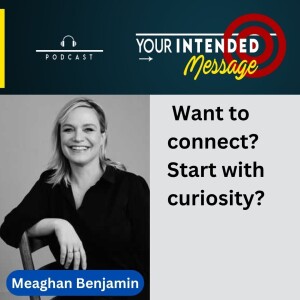
Thursday Jun 26, 2025
Agile Communication Creates Competitive Edge: Meaghan Benjamin
Thursday Jun 26, 2025
Thursday Jun 26, 2025
Help Your Audience Listen Better
Why Curiosity Is the Key to Connection and Leadership
Episode 263 (Meaghan is based in Chicago)
In this conversation with Meaghan Benjamin we explore:
-
The difference between credibility and rapport — and why both matter in leadership.
-
How communication habits are formed and the importance of adapting them.
-
What it means to practice agile communication in today’s digital world.
-
How curiosity fosters connection, learning, and innovation.
-
Why tone, gestures, and delivery shape how others receive your message.
-
How to use the Know–Feel–Do framework to craft more persuasive messages.
-
Ways to build fast rapport in emotionally or professionally high-stakes settings.
- The four levels of listening and how to move conversations to a deeper level.
-
How to help your audience become better listeners by how you speak.
-
The challenge and opportunity of virtual communication for modern professionals.
-----
About our guest, Meaghan Kane Benjamin:
-
Credibility vs Rapport
-
Rapport creates emotional connection; credibility is built by consistent follow-through.
-
-
Communication as Habit + Adaptability
-
Effective communication adapts to the context and people involved.
-
-
Agile Communication Framework
-
A methodology based on science, systems thinking, and storytelling.
-
-
The Power of Curiosity
-
Authentic curiosity drives rapport, empathy, and innovation.
-
-
Tone Is More Than Words
-
Tone, gestures, and expression shape how your message is received.
-
-
The Know-Feel-Do Framework
-
Define what you want the audience to know, feel, and do. Let the "feel" and "do" guide your messaging.
-
-
Build Rapport Fast in High-Stakes Moments
-
Especially in healthcare and business pitches, rapport often matters more than content volume.
-
-
Listening as a Shared Responsibility
-
It's not just about being a better speaker — help others become better listeners too.
-
-
Four Levels of Listening
-
From small talk (Level 1) to generative collaboration (Level 4).
-
-
Virtual Communication Challenges
-
With screens reducing non-verbal cues, intentional delivery matters more than ever.
-
-----
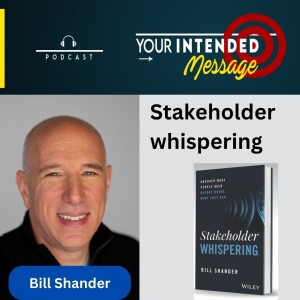
Thursday Jun 19, 2025
Visual Thinking to Communicate with Clarity: Bill Shander
Thursday Jun 19, 2025
Thursday Jun 19, 2025
How to Ask Better Questions Without Saying "Why?"
Stakeholder Whispering: Secret to Better Communication
Episode 262 (Bill is based in New Mexico)
In this conversation with Bill Shander we explore:
-
How to uncover what your stakeholders really need—beyond what they ask for
-
Why your first idea is often just an automated response
-
How to apply the Socratic method to guide people toward their own insight
-
Why asking “why” directly can feel hostile, and what to say instead
-
The power of “chunky segmentation” to clarify vague communication
-
How to balance divergent and convergent questions to get to the truth
-
What aporia means—and why a little confusion leads to breakthrough thinking
-
Why your visuals must reflect meaning, not just style
-
When and how AI can support visual storytelling and insight
-
Why it’s crucial to practice stakeholder whispering on yourself first
-----
About our guest, Bill Shander:
Bill has been teaching data storytelling and visualization for about 10 years for clients around the world and on on Linkedin Learning.
He is the author of "Stakeholder Whispering: Uncover What People Need Before Doing What they Ask"
You can find his book here: Stakeholder Whispering
-----
Key lessons from this conversation:
1. Most stakeholders don’t know what they really need.
-
Insight: Stakeholder requests are often surface-level assumptions, not true needs. Your job is to dig deeper.
2. Your first idea is usually just an automated response.
-
Insight: Pause before acting. The first idea might be convenient, but often lacks strategic depth.
3. Use Socratic questioning to help people uncover their own truth.
-
Insight: Ask layered questions to lead stakeholders into self-awareness rather than handing them answers.
4. Avoid hostile “why” questions—ask with curiosity instead.
-
Insight: Reframe your language: say “Tell me more about…” instead of “Why did you do that?”
5. Translate ambiguous requests using “chunky segmentation.”
-
Insight: Break vague statements (e.g., “We do masterclasses”) into discrete elements to clarify meaning.
6. Push stakeholders into a state of puzzlement (aporia).
-
Insight: Confusion can be a productive step toward clarity—help stakeholders get there.
7. Visuals are communication tools—not just decoration.
-
Insight: Choose visuals based on the real message, not just what’s easy to draw.
8. AI is a helpful partner, but only if you know your message.
-
Insight: Tools like AI are only effective after you’ve clarified your intent and message.
9. Leaders should hire people who push back.
-
Insight: Order-takers may be efficient, but real innovation comes from collaborators who challenge assumptions.
10. Practice stakeholder whispering on yourself first.
-
Insight: Self-questioning sharpens your ability to lead others through discovery and insight.
-----
Read the rest of this entry »
Thursday Jun 12, 2025
Personal Branding for the CEO: Alan McClaren
Thursday Jun 12, 2025
Thursday Jun 12, 2025
How Video Builds Trust and Your Bottom Line
How CEOs can Build Authentic Person Brands that Attract Opportunity
Episode 261 (Alan is based in Oakville, Ontario)
In this conversation with Alan McClaren we explore:
-
the power of authentic personal branding for CEOs and business leaders
-
how a Brand DNA session transforms fear into clarity and confidence
-
why video is the most scalable and trustworthy communication tool today
-
how personal stories build trust and eliminate competition
-
the mindset shift from curated perfection to authentic communication
-
why executives have a responsibility to share their insights publicly
-
the step-by-step process of personal branding through content strategy
-
how leaders can batch-create video content efficiently
-
the real ROI of personal branding: leads, partnerships, and visibility
-
how to avoid the trap of hiding behind a logo and start showing up online
-----
About our guest, Alan McClaren:
Alan is a personal branding expert and co-founder of STRATA Originals. He was CEO of marketing agency - InfinityComm. He's a long time member and officer of Young Presidents' Organization, YPO.
Learn more about STRATA Originals at: https://strataoriginals.com/
Get your free worksheet to clarify your personal brand: https://strataoriginals.com/elevate-your-brand-1
Connect with Alan on Linkedin https://www.linkedin.com/in/alanmclaren/
-----
Key Lessons from this Conversation with Alan McClaren:
-
Everyone Has a Personal Brand—Most Just Aren’t Leveraging It
-
Brand DNA Is the First Step to Unlocking Personal Clarity
-
Video Is the Most Authentic and Scalable Communication Medium
-
Personal Branding Is About Giving, Not Performing
-
Executives Have a Responsibility to Share Their Wisdom Publicly
-
Your Story Is Your Protection—No One Can Argue With Lived Experience
-
Posting Video Content Builds Trust Before the First Conversation
-
You Can Batch Video to Make It Easier and More Efficient
-
You Don't Need to Be Perfect—You Need to Be You
-
Leaders Who Share Their Perspective Attract More Opportunity
-----
Read the rest of this entry »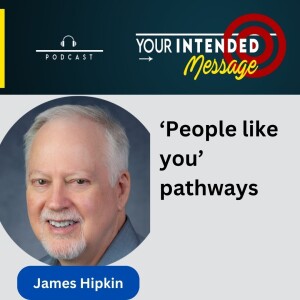
Thursday Jun 05, 2025
Empathy in Marketing: James Hipkin
Thursday Jun 05, 2025
Thursday Jun 05, 2025
Instead of Call-to-Action Do this
Inside-Out vs. Outside-In Marketing
Episode 260 (James is based in California)
In this conversation with James Hipkin we explore:
-
The difference between inside-out and outside-in marketing—and why it matters.
-
Why empathy is a marketer’s most powerful asset.
-
How to design a website that confirms, not converts.
-
The fatal flaw in “call to action” and what to say instead.
-
How to create “people like you” pathways for segmented audiences.
-
The power of micro-transactions to build trust and drive decisions.
-
The six elements your homepage must deliver in under six seconds.
-
How to leverage testimonials and trust signals effectively.
-
The real value of SEO: understanding search intent.
-
How AI can build customer avatars and journey maps affordably.
-
Why many marketing efforts fail due to lack of clear strategy and measurement.
-----
About out guest, James Hipkin:
James has worked in marketing and advertising for over 40 years. His clients included Sprint, Apple, Nestle, Toyota and Wells Fargo online bank.
Since 2010 James has helped his client build business with digital marketing. He's the author of "Journey to Success: Digital Marketing for Small Business Owners"
You can take arrange for your website audit at
Learn more about his marketing services at https://inn8ly.com/
-----
Key lessons from this conversation with James:
1. Empathy is the Core of Great Marketing
-
Learning Point: Effective marketers must understand their audience’s emotions, struggles, and perspective
2. Marketing Should Be Outside-In, Not Inside-Out
-
Learning Point: Focus on the customer’s needs, not your own accolades.
3. Websites Are for Confirmation, Not Just Conversion
-
Learning Point: A visitor comes to confirm if you understand their problem—not to be sold instantly.
4. Replace 'Call to Action' with 'People Like You Pathways'
-
Learning Point: Invite users into their own journey instead of shouting instructions
5. Design Websites Around Micro-Transactions
-
Learning Point: Every click, visual, and copy element should build trust incrementally.
6. Your Hero Section Must Do Five Things in Six Seconds
-
Learning Point: In 6 seconds or less, your website must confirm identity, state benefit, show credibility, offer clear navigation, and deliver easy-to-consume content.
7. Testimonials and Credibility Should Be Visible Upfront
-
Learning Point: Place a compelling testimonial or credibility bar near the top of the page.
8. SEO is Not Dead — It’s Misunderstood
-
Learning Point: SEO helps you understand search intent more than rank your site.
9. Use AI to Build Customer Avatars and Journey Maps
-
Learning Point: AI can help generate data-driven insights at a fraction of traditional research costs.
10. Measure What You Do — Or You’re Just Guessing
-
Learning Point: Without strategy, planning, and measurement, marketing efforts collapse.
-----
Read the rest of this entry »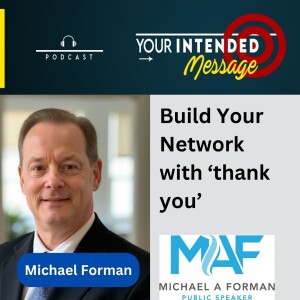
Thursday May 29, 2025
Networking Success. Build Relationships that Count: Michael Forman
Thursday May 29, 2025
Thursday May 29, 2025
Networking for Introverts: Break the Ice Confidently
Transform your Networking Mindset from Sales to Service
Episode 259 (Michael is based near Atlanta)
In this conversation we explore:
- Why networking should focus on giving rather than receiving.
-
How to build trust through active listening.
-
The FORM method to start conversations naturally.
-
How to practice introductions and grow more confident.
-
Why handwritten thank you notes boost your response rates.
-
How to prepare yourself mentally for networking events.
-
How to use your CRM to build real relationships.
-
How to politely redirect a conversation when someone won’t stop talking.
-
How Michael’s military experience shaped his leadership and networking approach.
-
How to empower employees and turn them into networking ambassadors.
-----
About our guest Michael A. Forman:
Author of the book, Networking Unleashed: Mastering the art of Networking and host of the podcast by the same name.
He's a veteran of the US Air Force and served in Desert Storm.
Learn more about his book and take his digital course at
https://www.michaelaforman.com/
-----
📌 Key Learning Points
-
Networking is about giving, not just receiving.
Michael emphasizes a servant’s heart approach—helping others first without immediate expectations. -
Active listening builds trust.
Listening means not planning your reply but really hearing the other person. -
Memorable introductions create connection.
Practice making introductions personal and genuine—mention something specific about each person. -
Use the FORM method for conversations.
FORM = Family, Occupation, Recreation, Message—it’s a reliable framework to get others talking comfortably. -
Handwritten thank you notes have huge impact.
They significantly increase response rates compared to just an email follow-up. -
Networking is a skill that requires practice.
Confidence and memory improve over time by consistently introducing others and engaging actively. -
Keep track of contacts and conversations.
Use a CRM and note key details from conversations to build real relationships. -
How you prepare matters.
Practice conversation openers in front of a mirror, use compliments to start conversations, and smile—even if it’s a “fake” smile at first! -
Know when to politely interrupt.
If someone won’t stop talking, find a respectful way to redirect or pause the conversation. -
Military experience shaped Michael’s leadership and networking style.
Building trust and respect in the military laid the foundation for his networking skills.
-----
Read the rest of this entry »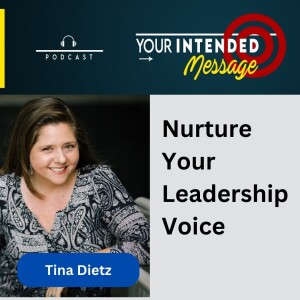
Thursday May 22, 2025
How to Sound More Trustworthy: Tina Dietz
Thursday May 22, 2025
Thursday May 22, 2025
Vocal Confidence: The Hidden Key to Leadership
Voice Training Tips for Team Leaders and Executives
Episode 258 (Tina is based in Florida)
In this conversation we explore…
-
…why voice pitch influences leadership credibility and income.
-
…how vocal qualities like tempo and sonority affect trust.
-
…the cultural biases and perceptions surrounding vocal fry.
-
…how to warm up your voice quickly and effectively before a speech.
-
…why tempo is the #1 indicator of confidence and credibility.
-
…how authors can decide whether to narrate their own audiobook.
-
…the current limitations and ethical concerns of AI-narrated audiobooks.
-
…how singing and vocal exercises can improve vocal performance.
-
…how to be more curious and less judgmental in conversations.
-
…what new leaders should do to gain trust and assess team dynamics.
-----
About our guest, Tina Dietz:
Tina Dietz has launched two companies which have been disrupting the audiobook and publishing industries. Check them out at
https://twinflamesstudios.com/
You can listen to the monthly expert panels for nonfiction authors and publishing pros https://twinflamesstudios.com/panels/
-----
Key Learning Points
-
Lower Pitch = Higher Trust
-
Deeper voices are culturally associated with leadership and credibility.
-
CEOs with lower voices earned $180,000 more annually on average.
-
-
Voice Is a Thumbprint of Identity
-
We recognize people more by voice than face in many contexts.
-
Self-perception of our voice often misaligns with how others hear it.
-
-
Tempo Indicates Confidence
-
Comfortable pacing and controlled breathing signal authority.
-
Speaking too fast or slow undermines credibility.
-
-
Vocal Fry Carries Cultural Baggage
-
Once linked with lack of credibility, now more accepted.
-
May stem from women lowering voices to be taken seriously.
-
-
Warm-Ups Improve Vocal Quality
-
Breathing, facial massage, yawning, and tongue twisters can reduce tension and increase sonority.
-
-
Confidence Can Be Trained
-
Singing, vocal exercises, and throat relaxation build vocal presence.
-
Apps like Vocal Image use AI to measure improvements.
-
-
Narrating Your Audiobook? It Depends
-
Quality trumps personal voice unless you're skilled and comfortable.
-
75% of Tina’s clients successfully narrate their own books with guidance.
-
-
AI Audio Narration Isn’t Ready Yet
-
Quality and rights issues persist with AI narration tools.
-
Human narration still dominates in credibility and listener preference.
-
-
Curiosity Beats Judgment
-
Openness invites understanding and reduces defensiveness.
-
Phrases like “Tell me more” and “Let’s explore that” build connection.
-
-
New Leaders Should Lead with Listening
-
Assess team culture before imposing change.
-
Start with questions, not assumptions.
-
----
Read the rest of this entry »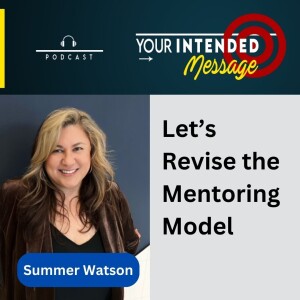
Friday May 16, 2025
Why Traditional Mentorship Fails in Today’s Workforce: Summer Watson
Friday May 16, 2025
Friday May 16, 2025
How to Create a Sense of Belonging at Work
Retain Talent and Boost Innovation with Cross-Generational Mentoring
Episode 257 (Summer is based in Washington DC)
In this conversation we explore…
-
Why traditional mentorship models are no longer effective in today’s multigenerational workforce
-
How a horizontal mentorship model fosters mutual respect and learning
-
The psychological need for belonging and how it fuels engagement at work
-
How ego can sabotage collaboration, communication, and innovation
-
How Core Mentorship Solutions creates inclusive mentorship systems
-
Why generational stereotypes hinder productivity and retention
-
How to identify whether your organization needs a new mentorship approach
-
The critical role of intentional onboarding and communication
-
How cross-generational dialogue drives creativity and innovation
-
The power of message delivery—how tone, timing, and framing affect outcomes
-----
About our guest, Summer Watson:
Summer Watson is the owner of KORE Women, which supports companies to develop thriving cross-generational leadership and mentorship programs fostering healthy and sustainable communities.
KORE stands for
Kinetically connect,
Organically learn from one another,
Reshape lives through diverse interaction,
Empower one another to promote change,
Learn more about Summer Watson and KORE at
-----
Read the rest of this entry »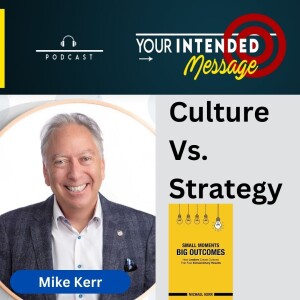
Thursday May 08, 2025
Culture is the #1 Competitive Advantage: Mike Kerr
Thursday May 08, 2025
Thursday May 08, 2025
Stop Outsourcing Culture to HR
From Toxic to Terrific: Small moments create big shifts
Episode 256 (Mike is based in Canmore, Alberta)
----
In this conversation we explore:
-
The difference between workplace culture and humor—and how humor supports culture.
-
Why culture is a company’s number one competitive advantage.
-
The visible and invisible signs of strong or weak workplace culture.
-
The impact of leadership on shaping and sustaining culture.
-
Why every employee contributes to culture—not just HR or leadership.
-
How intentional values and small behaviors shape long-term culture.
-
The difference between healthy and toxic conflict at work.
-
Simple, practical ways to assess and improve workplace culture.
-
How humor, rituals, and fun foster psychological safety and team connection.
-
The concept of an "umbrella value" and its influence on decision-making.
-----
About our guest, Michael Kerr:
Mike is the author of 9 books, including, The Jerk-Free Workplace, The Humor Advantage and Small Moments, Big Outcomes: How Leaders Create Cultures That Fuel Extraordinary Results.
Learn more about Mike Kerr, his services and books at https://mikekerr.com/
-----
Key Learning Points from the Interview
-
Culture is a Competitive Advantage
-
Culture impacts productivity, retention, customer loyalty, and overall performance more than strategy alone.
-
-
Mojo Matters
-
Mojo is the vibe or energy of a workplace—it can be felt and should be maintained intentionally.
-
-
Humor Fuels Culture
-
Humor isn’t fluff; it builds psychological safety, encourages engagement, and reduces burnout.
-
-
Leadership Sets the Tone
-
Leaders act as culture conductors. Their words, mood, and mindset ripple through teams.
-
-
Everyone Owns Culture
-
Culture isn’t HR’s job alone. Every employee contributes to culture in every interaction.
-
-
Small Moments Have Big Outcomes
-
A culture is shaped more by consistent small gestures than by grand slogans or posters.
-
-
Define and Live Your Values
-
Real values are reflected in daily decisions, not corporate posters. Misaligned values create cynicism.
-
-
Conflict is Inevitable—Make It Constructive
-
Healthy cultures allow disagreement without blame or fear. Psychological safety matters.
-
-
Assess Culture With Gut Checks and Simple Questions
-
Ask: Would you recommend this workplace to a friend? What’s one thing you’d change?
-
-
Culture Attracts Talent
-
Great cultures draw top talent. But to win them, you must showcase culture honestly and creatively.
-----
Read the rest of this entry »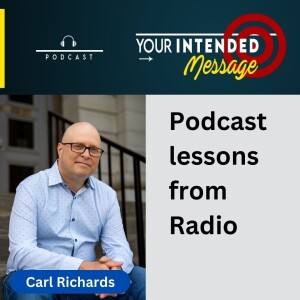
Thursday May 01, 2025
From Radio to Podcasts: Carl Richards
Thursday May 01, 2025
Thursday May 01, 2025
Podcasting vs. Radio: Carl Richards Explains the Big Shift
The Secrets to Sound Bites: Make Your Message Memorable
Episode 255 (Carl is based in Gananoque, Ontario)
-----
In this conversation, we explore:
-
The evolution from radio to podcasting—what changed, what remained.
-
The core differences between scheduled radio and on-demand podcasting.
-
Why defining your podcast’s purpose is the most important first step.
-
The myth of instant podcast success and what to expect as a beginner.
-
Why your podcast will (and should) evolve over time.
-
How to handle tough or off-topic interview questions with grace.
-
What makes a podcast guest truly engaging and memorable.
-
The secret to crafting effective sound bites for reels and audiograms.
-
Lessons learned from 25 years in broadcasting—and how they apply today.
-
Why podcasting is the new “book tour” for subject-matter experts.
-----
About our guest, Carl Richards:
Carl has spent more that 25 years behind the microphone, on radio and on stage, entertaining and influencings audiences worldwide.
He's a 3 time bestselling author, International Speaker, TEDx speaker, emcee and podcast host. He's the founder and CEO of Podcast Solutions Made Simple.
Want help to launch and polish your podcast? Visit PodcastSolutionsMadeSimple.com
-----
Key Learning Points
-
Podcasting is on-demand, radio is scheduled
The flexibility of podcasting suits today’s consumer behavior better than traditional radio. -
Start your podcast with clarity of purpose
Many beginners skip this—understanding the "why" of your show is foundational. -
It’s okay—and smart—to evolve your podcast
Goals can shift, formats can change, and that’s part of the process. -
Your first 10 episodes will probably suck—and that’s normal
Skill and confidence develop over time with practice. -
There are no rules in podcasting—but there are smart suggestions
Format, length, and style are flexible. The key is knowing your audience and message. -
Deflecting tough or irrelevant questions is a skill
You can stay assertive without being aggressive when you don’t have the answer. -
Preparation is key—know your host and their style
Doing homework helps avoid surprises and builds trust. -
Sound bites need human judgment
Algorithms can’t always pick the best clips. Listen and choose what resonates. -
Credibility comes from consistency and authenticity
Be yourself, be present, and bring your best self to the mic. -
Podcasting helps subject-matter experts elevate their brand
In today’s world, a podcast may be more relevant than writing a book.
-----
Read the rest of this entry »
Thursday Apr 24, 2025
Why Profitable Companies Go Broke: David Safeer
Thursday Apr 24, 2025
Thursday Apr 24, 2025
Accounting Myths That Sink Small Businesses
How to Forecast Cash Flow and Stop Guessing
Episode 254 (David is based in Salt Lake City, Utah)
-----
In this conversation we explore…
-
Why traditional accounting fails to protect small businesses.
-
How cash flow differs from accounting and why it matters more.
-
The danger of relying on profit and loss statements alone.
-
How to recognize early warning signs of cash trouble.
-
Why even profitable companies run out of money.
-
The mindset shift needed to forecast financial stability.
-
The power of the 13-week cash flow model.
-
How to calculate and build sufficient cash reserves.
-
The role of risk in financial planning and survival.
-
How strategic timing of payments protects your cash.
-----
About our guest David Safeer:
David has done business in over 40 countries. He restructured a Fortune 100 company from years of losses to profitability in one year.
He is known as the Unconventional Cash Flow Guy.
Improve your cash flow with a free copy of his ebook, "24 Profit Strategies for Business Success" at http://cic60.com/
----
Key Learning Points
-
Accounting ≠ Cash Flow: Accounting reports don’t reflect the cash available.
-
Cash Flow Conversations Are Rare but Critical: Business owners often focus on revenue/expenses and overlook cash movement.
-
Symptoms vs. Root Causes: Issues like payroll trouble often stem from deeper systems or margin problems.
-
The P&L Illusion: A profit on paper doesn’t mean there’s cash in the bank.
-
Modeling Is a Lifesaver: The 13-week cash flow model helps foresee challenges.
-
Mental Game of Money: Cash flow stress impacts decision-making and sleep.
-
Cash Reserves Save Businesses: A few weeks of reserves can prevent shutdown.
-
Cash Flow Needs Monitoring: Weekly modeling can prevent surprises.
-
Accountants Aren’t Always Experts in Cash: Many don’t understand or prioritize it.
-
Liquidity from Hidden Assets: Inventory and unused assets can become emergency cash.
-----
Read the rest of this entry »